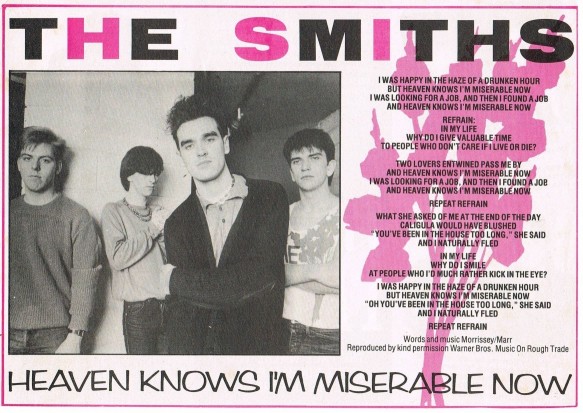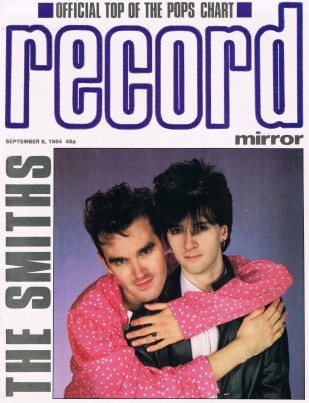1984:
May-August
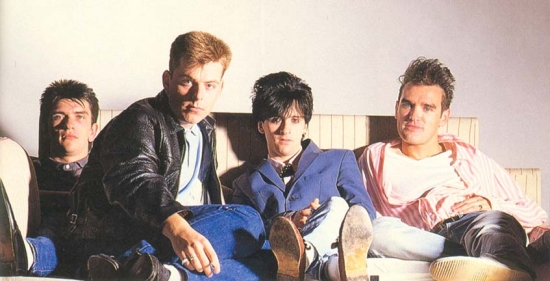
Photo by Peter Ashworth. Reproduced without permission.
ARTICLE
This article was originally published in the May 6, 1984 issue of Jamming!
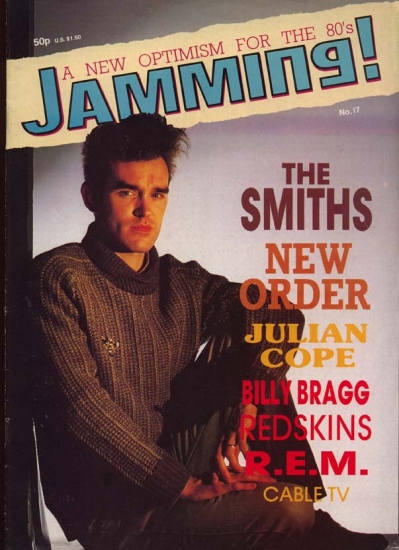
by Jonh Wilde
Let me begin my dream, and let's be abrupt, not only for the moment. Can music reach the stillness? How much is worth all the fuss, the dressing up and the expectations? To consider the highest and the best here is to weigh up, in all seriousness, our favourite moments, transports of delight and the glory of melody sweeping in upon our daze, opening us to the prospects of a new thrill, transition and the winds of change. Surely nothing less? And therefore. Between the quality of the pop single that gleefully disrupts the balance of our days and the merit of the three minutes that entertains but leaves us unaffected lies the genius of the great pop record. We could hover just there, believing that the imagination must dance... what is sure?
Last year, amidst the mass of music that was all too much of a muchness, too tolerant and unobjectionable, there was The Smiths, thank Christ. Their second release of '83, "This Charming Man," the follow-up to "Hand In Glove," contained almost everything essential about the modern pop song, its go-full-tilt READY TO BURST panache having the agitating edge that is sudden, contorted in motion, its grace ingrained in its unpolished, unfinished surface.
No illusions. The Smiths are the first great aesthetic pop band since The Buzzcocks, at least, transforming our expectations of how much energy could be conceived in three minutes of song and dance. The Smiths, translating vision into sound, are not far from life, not just concerned with singing about beauty, sorrow and love but ultimately intent on capturing the first nervous bursts of them all in every three minutes.
They obviously knew the value of beauty and were aiming at the highest, recognising that alongside the problems of time and death and God should exist the image of the girl of our dreams, insisting that the imagination MUST dance, with a sudden sway.
"This Charming Man," let's not pretend otherwise, was heart-melting, fidgeting about, forgetting oneself. We've come so far since, what difference does it make? What happened next? I don't want to be too accurate. Trembling with pleasure, a twinkle of the eye and everything held back (just for the moment), another burst of speed, a clean pair of heels and away. Laugh? I didn't waste a moment. It was time to clip their wings, heckle and haggle, pull the rug from under them. Me and Morrissey met somewhere. It might have been a bus-stop.
Jamming!: Persuade me.
Morrissey: We seem to have some incredible depth of character. I believe that I have a great deal to say, so I would never shun an interview. Especially now in such desperate times! I think it is crucial to say as much as possible. I hate the way that people shun it all - it just foxes me.
Thinking aside... how concerned is it all? Don't be too accurate.
It's not so much political as common sense. It just seems that sense is not very common anymore. Everybody is waiting to hear a voice saying something - either musically or politically. I just don't hear it. It's just like grinding out sausages; we never grind our sausages.
You seem quite close to perfection. I wanted to know just how close.
To me, at the moment, it feels completely perfect. I feel that if the group was accepted by the entire universe tomorrow, it wouldn't surprise me. We do have everything. I think you must have that attitude or you will be swept under the door. I cannot think of any limits, I feel I'm a completely open book in every way. As a wordsmith, though, I feel as though I've just written a comma so far. I feel as though it has hardly begun. I believe that we've just started to chip away. It's more important than breathing.
So what makes you shout and jump and write and how close are The Smiths to real life?
Most of my inspiration does come from outside music - especially literature and particularly Oscar Wilde. But I am incredibly fond of popular music. My first record was Marianne Faithful's "Come Stay With Me" which I bought when I was very young. I remember it had a profound effect on me, and from that time, I was totally obsessed with all aspects of popular music. I like Sandie Shaw and The Marvelletes. Within current music, I can only think of people who have chased their own tails, then crumbled.
I wasn't going to ask about your sex life, but...
I think I try to be very unsexual/asexual about the way I write. I haven't pinned any gender on the table and been very forthright. I think by being completely sexless, it has caused some degree of attention, so people believe I'm totally obsessed with sex. It's a strange paradox - if I wrote about breasts, people would probably ask me about The Clash all the time. Because I've said publicly that I'm not interested in sex, people are always asking me about it.
So much rock 'n' roll is masturbatory in a way, very phallic at times - sex is almost completely linked with it. But I can't help that - it's just the history of the entire syndrome. I think it is very masturbatory because it is the height of glamour. It's just like somebody standing on stage saying, 'I'm up here, this is what I can do, you must worship me now'. I think that sex element does come into it.
So where do The Smiths fit in amongst the sex, the glamour and the star-spangled world of rock 'n' roll?
We have a very traditional line-up. It's nothing special but it's very special. We are four individuals; we just simply open our hearts and open our mouths. If that isn't enough, we might as well go home. We don't have any metaphysical plan - there is nothing gimmicky that we want to rope people in with. We are four individuals, naked before the world - people will either react, or not.
It strikes me that many people who are stars are shallow individuals. It is rare that you get anybody up there who has incredible depth or value. It seems that there is a shallow veneer to so many people. I prefer to think of us as accessible rather than commercial. Obviously, we want to be very popular. We have this particular intelligence that means we will never get swept away with the mundane and moronic popular groups. There is an attitude that if you are strong-willed, then you will turn your back on the charts, television etc. But we want to utilise all those avenues. If you are weak, you will take those avenues, have a hit record, get swept away and people will dominate you. But if you are sure about what you do, it won't happen.
What is important? What is sure? You talk about the depth of The Smiths and I wonder.
The records have to be memorable - it's not just an instant fad thing, the flavour of the month or whatever. If I thought we were going to be in vogue until February or March, then the whole thing would be repellent to me. It has to be memorable.
These terms like 'charming' and 'handsome' that we cling to - it is a positive calculation. So much music in recent years has been such an inverted, dour and depressing atmosphere thrust upon audiences. I just became so tired of the attitude that seemed to be riddled through groups and writers. I wanted to inject a new attitude into everything, that people don't have to be cool and monotonous any more - they can just relax, do anything they want, follow their hearts in every direction. There is that entire non-human feel with the use of synth in so much music now. The Smiths are an argument against that.
I cannot imagine what I would be doing if I didn't have this group. It is so essential to me. It's such an emotionally edgy thing. It seemed before that everything I wanted to say was just locked away. I just couldn't communicate with people. The Smiths is my mouth-piece and it's also my dream. It's such an immense gratification when we get so many letters saying exactly what I want to hear. People seem to be affected by the slightest lines and the slightest gestures.
Would it be fair to say that you write love songs (with a difference)?
In many ways, they are love songs, though in my case they would be concerned with self-love. I would say that they were complete celebrations - even celebrations of sexuality if people want to take it that way. They are all concerned with making use of what you are and what you've got.
The 'classic love song,' for me, was never a love song - it was just a statement. We are probably writing classic love songs. They are very open about falling in and out of love, expectations, love and hate. Because they are so to-the-point, they can be quite brittle.
Do you not recognise a measure of obscurity in the songs, a kind of ambiguity?
I get very annoyed when the word 'obscure' is brought into the whole context. I feel that I go to great pains to be very direct and precise. I don't want to be misunderstood in anything I say. I think it has been a trend in recent years to be very obscure and very surreal. The Smiths must be understood on every level, in every way.
You've talked before about tragedy.
Most of the songs are about my own life, which has been quite tragic, so most of the songs are concerned with tragedy in some way. I treat tragedy in a very personal and real way. I speak from direct experience, as down-to-earth as I can. Ultimately it is very optimistic. I feel that I have been very explicit in all the songs I have written. I really have to write very personal, I can't hide behind things. I can't join in the short-sightedness of modern lyricists.
There seems that there is this messy, unwritten law that you cannot say certain things. I have to be open, but I find it impossible on a 'friendship' level. Because of that, it is all channelled into The Smiths. Because I was silent for so long, it is now quite easy for me, just to express everything.
I'm not interested in painting my personality in the songs - that sounds a little artificial. I'm totally immersed in the whole idea of this group - 25 hours a day. I'll stand by it to the death.
Does it all overawe you sometimes, the sudden sweep to success with 'This Charming Man,' TOTP and the hungry attention?
It doesn't overawe me because I believe that what we do is so special - therefore I expect us to attain the highest degree of success. We do expect more - when I see the songs that got higher in the charts than 'This Charming Man' or when I think of the songs that will get higher than 'What Difference Does It Make?,' there is no way I can sit back.
Your climb to acclaim has been almost meteoric and there's no pausing for breath. Is it all so sudden and splendid?
Up to now, it has all been marvellous. The only tragedy for The Smiths has been that 'Hand In Glove' didn't gain the attention it deserved. I won't rest until that song is in the heart of everything. It's been given another lifespan because it's been re-recorded for the LP. But it should have been a massive hit. It was so URGENT - to me, it was a complete cry in every direction. It really was a landmark. There is every grain of emotion that has to be injected into all the songs and it worked perfectly with 'Hand In Glove'. It was as if these four people had to play that song - it was so essential. Those words had to be sung.
Persuade me (again).
We want to reach as many people as possible. We've hardly begun. We try not to comply with any other attitude - whether it be the attitudes of groups on major record labels or on independents. We will appear on The Russell Harty Show and Cheggars Plays Pop. We think we can do these things and walk away with enormous credibility because we are very strong-willed characters and our belief is very deep-rooted. We just have immense strength - the musicianship is quite special. There is a great deal of depth that just hasn't seen the light of day, yet. It's self-evident really. It's all in those songs. Believe me.
Is there anything else? Don't be too accurate.
Here's my bus. What difference does it make?
I don't want to get carried away but. We've come so far and The Smiths burst into life, accidentally and out of context. I don't want to get carried away but. The Smiths breeze in, wasting no time with an acute sense of beauty. How can you resist? The secret is... don't give in to grief, be enraptured by a single smile and this is the year of The Smiths. Full of life and from birth (Sept. '82) to just a moment ago, they have been concerned with a complete lyricism and a constant flux of emotion. One eye on perfection and the other on the next nervous burst. Can we ask for more? Not yet.
I don't want to get carried away but. I had this dream. There was me and Morrissey at a bus-stop. We agreed on one thing. They were worth the fuss. But. I forget to ask. Can music reach the stillness? What happened next?
Thanks to Tony Fletcher for allowing this article to continue to appear at this website.
See the original article here
SINGLE REVIEWS
HEAVEN KNOWS I'M MISERABLE NOW - released May 1984
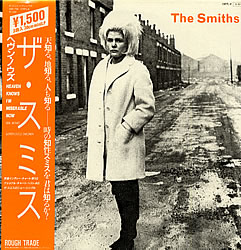
"I must be one of the small number of people who actually believe that The Smiths are not the saviours of Western Pop as we know it. Apart from 'This Charming Man', what difference have The Smiths made except to reinforce how boring and ordinary groups can be these days? You have to do more than dish out a staple diet of Oscar Wilde, teenage angst, existentialism, and Sandie Shaw infatuations to see this boy crumble. The ambiguity of their lyrics might well be an applauding point but that's just a drop in the ocean compared to the straight faced dourness of most of their music. That said, 'Heaven Only Knows' (sic) cunningly re-dresses the balance. A jewel of a melody, a timeless arrangement, the sheer languid charm of Morrissey's vocal performance, the deeper suggestions of his words, the buried ideas, all add up to the proverbial shiver-down-the-spine. It's a record like this that makes me start to understand the love vested in them, even if the last time I saw Morrissey he had approximately half his front lawn hanging out of his back pocket. And if you're about to complain bitterly about the NME building them up to knock them down policy, forget it. I never promised them a rose garden."
Unknown reviewer
New Musical Express, April/May 1984
Reprinted WITHOUT PERMISSION for non-profit use only.
"Smith-songs do tend to sound a bit similiar, with that voice and that guitar, but this has none of the propelling urgency that made 'This Charming Man' so great.
It's a slow, rather depressing track about how when you get want you want, you often find it's not what you wanted after all.
This is undoubtably true, and gives Morrissey full rein to ask questions like "Why do I smile at people I'd much rather kick in the eye?" and "Why do I give valuable time to people who don't care if I live or die?".
Doesn't sound like he's enjoying the pop star lark much."
Karen Swayne
No. 1, May 26, 1984
Reprinted WITHOUT PERMISSION for non-profit use only.
"While growing faintly irritated by Morrissey's continuing list of ailments, it has to be said that this is their best yet. For once the song and the backing seem to belong together while Mr Jolly croons and thoroughly enjoys being a martyr to misery. Top Ten would be about right."
Unknown reviewer
Smash Hits, April/May 1984
Reprinted WITHOUT PERMISSION for non-profit use only.
"The predictable and unnecessary Smiths backlash is now in full flight but can anyone dislike such a masterful song as this? The branch-adorned Morrissey sings his maudlin way through the personal lament of the week - a soaring ballad that deserves lots of attention so don't get caught in the bushfire, backlashers."
Dylan Jones, Record Mirror
Reprinted WITHOUT PERMISSION for non-profit use only.
To watch a rare television performance of 'Heaven Knows I'm Miserable Now' on YouTube, click here
This lyric sheet originally appeared in No. 1 magazine
LIVE REVIEWS
SHRINKING VIOLETS
Markthalle, Hamburg - May 4, 1984
Debut album tour (European leg)
"OF course it's a shame, a terrible shame, but it has to be said. The charm and magnificance are not all-enveloping, Morrissey is not totally hypnotising, and live, the music will tend to grate on the nerves.
I really want to believe in The Smiths - their politics and visions are admirable in their bravery - but are The Smiths really going to change the face of music and our attitudes in general? Already the initial trifling indications of their stance are crumbling embarressingly apart - witness the sterile and farcical flowers-on-demand routine of Morrissey in front of the glowering German TV cameras.
Being "Rockpalast" week, the annual rock festival filmed live for international viewing, The Smiths of course felt they had to pander to all public expectations of their image. Except this time the tactics exposed themselves as forced gimmickry - Morrissey's style of loose smocks and daffodils stuck in his bum came across as a tiresome flower-power cliche, tacky and calculated. Okay, let's all be humble, peaceful and aspiring - dig the image man - but for some of us, coupled with The Smiths' tedious repetitive musical style it's all a big groan.
So, that cast aside, let's look at The Smiths without the bloated philosophising and sycophancy that's dangerously rooting itself around their persona. Johnny Marr's Rickenbacker guitar work tonight did merit a standing ovation, so bright and forceful were the notes that formed an artful foundation for each song. Instead of the rather self-indulgent, wimpy mood he sets on vinyl, his chords carry a harder conviction onstage - the real solid warmth that is needed to complement Morrissey's initially alienating vocals.
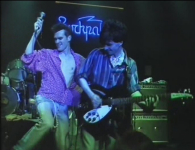
Now that so many of us are acquainted with Morrissey's distinctive vocal style, the melodic plaintiveness occasionally becomes warm and coaxing. True, the idiosyncracy, particularly in its ballad form, turns into a whining monotony after an hour. But Morrissey's voice should be taken in small doses at regular intervals - otherwise you'll be put off it for life.
Sadly, with the forced atmosphere partly due to the TV recording and illness in the band, The Smiths had no chance of achieving real atmosphere or magic tonight. Getting down near the front for the encores in an effort to shake off the turgid banality that seemed to be hanging in the air, I realised, with the band in full motion just a few feet away, that I wasn't missing out on anything after all. The material was all there - like two helpings of "This Charming Man", the obligatory "Hand In Glove", and "What Difference Does It Make?" (what difference indeed?). Morrissey was doing his soulful stuff and the rest of the band were delivering the required input - but where was the alleged beauty and charisma?
Let's be realistic about The Smiths. They aren't quite God's gift to the human race. Flowers are only fragile, after all, and in front of the full media glare of the cameras tonight Morrissey's daffodils were already turning brown at the edges."
Sally Gethin
Melody Maker
Reprinted WITHOUT PERMISSION for non-profit use only.
See the original review here
To watch The Smiths perform at Rockpalast on YouTube, click here
Belfast Ulster Hall, Northern Ireland - May 17, 1984
"The Smithereenies on the front row will take me to task, I know, but the only noteworthy aspect of this evening's show was that everybody's favourite shirt, Morrissey, is still managing to prance about with a well-tended window-box up his arse!
Still playing at being a neo-hippy Byron in baggy trousers, flopping (and fopping) about like a bloodhound's jowl, it's about time Morrissey started acting his age on stage and not his bloody shoe size. Three songs into the set and the keen edge heels completely. There's no brunt about anything.
The circular, skipping guitar lines pall. The song lines start sounding like bored, bloodless, defused piss-takes and the exasperating similarity of handling of 90 per cent of the titles presses out most of the interesting little creases and kinks in the Smiths' upholstery. An unfettered display of reckless triviality, in fact.
The Smiths would appear to be degenerating into an effete, mincing version of The Pretenders on this evidence, and I reckon M should take another tip from Chrissie and do the decent thing by Sandie soon. Anything to at least partially halt the collapse of the band into the annoying, silly, blubbering, infantile mess on display tonight.
The common-or-garden Smiths - lots of flim-flam, lots of skullduggery, no great shakes."
Adrian Maddox
Melody Maker
Reprinted WITHOUT PERMISSION for non-profit use only.
See the original review here
Morrissey on...

the Music Press
Well... I do read the music press so it's very nice to have that media approval. But it doesn't determine the way I write. I never sit down and say, well I really have to do this because otherwise such and such a paper won't like me very much. That doesn't happen. But it is very good to get the support of the music press. I can't deny that.The press does appear to be particularly fond of you - does that please you?
Things have changed slightly now with all the music press, though. And I do get the advance chill of a backlash. And it's bang on time. And it's really quite... um... expected.
Are you ready for it?
Yes, largely. I mean, I think we're quite indestructible in many ways. But I'm not saying that I'm terribly happy about it. For instance, quite recently we played Belfast - two and a half thousand people in a sell-out concert - and it was really quite hysterical, quite wonderful. We did four encores and everybody was enormously receptive and then I read this review which implies that the whole thing was entirely damp, entirely forgettable, and nobody cared. And then I read another review by a person who saw a concert in Sheffield and doesn't mention the event in any vague detail - simply analyses my character and destroys it. It does seem quite hateful and quite destructive, and I don't understand it completely. But ultimately I'm above it, so it doesn't really matter.
- Earsay interview, 1984
Read more in the September 8th issue of Record Mirror
Click on magazine cover to begin
NEWS ITEM
This news item originally appeared in the September 15, 1984 issue of Melody Maker.
THE SMITHS IN 'MOORS' ROW
RECORD stores nationwide have withdrawn copies of The Smiths' album as well as their last single, "Heaven Knows (I'm Miserable Now)".
The Boots and Woolworths chains have refused to continue selling either record due to the lyrical content of a song called "Suffer Little Children". Featured on both the album and the B side of the single, it's been deemed offensive to relatives of the children who died in the infamous Moors Murders of the Sixties.
Although there's been controversy in the past about the lyrical content of the song, which deals with the killings, it's only recently that official complaints have been made by relatives of the murdered children - Lesley Ann Downey (aged 10) and John Kilbride (12).
Boots say: "We had a complaint from the Kilbride family, and as a result of that, we decided to withdraw both the album and single because there were words which tended to be offensive to the family."
And at Woolworths, a spokesman said: "The Manchester Evening News telephoned us to say that one of the relatives of one of the Moors murdered children had complained that we and other stores were selling these records by The Smiths. We played the song and had a discussion. There was an investigation and we decided to take the records off sale altogether."
However, the ban has not been taken up by other major record chains. At Virgin, a spokesman said "it hasn't been withdrawn as far as we know", and at HMV Records, the word was that "we're looking into it first."
A spokesman for the group said this week: "The Smiths stand behind 100 per cent of the lyrics to all of their songs and 'Suffer Little Children' is no exception. The song was written out of profound emotion by Morrissey, a Mancunian who feels that the particulary horrendous crime it describes must be bourne by the conscience of Manchester and that it must never happen again. It was written out of deep respect for the victims and their kin and The Smiths felt it was an important enough song to put on their last single even though it had already been released on their LP.
"In a word, it is a memorial to the children and all like them who have suffered such a fate. The Smiths are acknowledged as writing with sensitivity, depth and intelligence and the suggestion that they are cashing in on a tragedy at the expense of causing grief to the relatives of its victims is absolutely unture.
"Morrissey has had a lengthy conversation with the mother of Lesley Ann Downey, Mrs West, and she understands that the intentions of the song are completely honorable. Furthermore, he's willing to speak to any immediate members of the families involved so there will be no misunderstanding.
"As for the photograph on the record sleeve which bears a resemblance to Myra Hindley, it is, of course, Viv Nicholson, whose picture was chosen to illustrate the record 'Heaven Knows I'm Miserable Now'. The photo was taken in 1961 and was first published in the News Of The World years before the tragic event occured.
"The decision to put 'Suffer Little Children' on the B side was made well after the choice of Ms Nicholson's photo had been made and although it is a chilling coincidence, there is no further connection."
Reprinted WITHOUT PERMISSION for non-profit use only.
See the original item here
ARTICLE
This untitled interview with Morrissey originally appeared in the Manchester fanzine Square Peg.
Square Peg:
Morrissey interview
When I first saw The Smiths I was awestruck. They were so sexual. Not in that usual way in which pop groups feel they have to behave, but in a much more honest way, giving an intuition rather than an imitation of life. Anyone who waves a bunch of the most spectacular sexual organs in nature around his head while singing of lost innocence knows what he's doing! And of course people considered Morrissey a totally unlikely pop star... but then hasn't everybody remarkable in popular music been not only a synthesis of past images but also something totally unlikely, completely out of the blue and even attractively off-putting? Morrissey has been misunderstood and reviled both for his image and the content of his lyrics, which carry hints of desperation, frustration and a dark understanding of the urges which lead us on.
You seem increasingly disillusioned with the media circus. Are you no longer flattered by the attention?
Frankly, I've got quite bored with much of the music press interrogation. They always seem to resign themselves to three known topics, which initially was quite interesting, but you get beyond that little point of interest. It sounds very pompous to say these things because I feel I'm in a position that many people could quite possibly envy but the reality is that after doing something like 'Pop Quiz' I do get very depressed because it doesn't seem to have any bearing on the way I feel generally and the reasons I came into the music industry; it seemed to me like Crackerjack.
Someone more cynical than I might suggest that there is a cynical brain operating behind The Smiths, that certain defenceless targets have been pinpointed, that you stand almost as a Statue of Liberty to those outcasts with no voice. One might say that you are merely saying things that will appeal to those disenfranchised record buyers who perhaps choose not to participate in the accepted teenage life. How do you feel about this criticism?
I don't know whether it is a criticism - to me it's an absolute fact, but it doesn't have to be a bad thing, saying that I've done this or this to sell records. I want to sell records but I don't want to sell bad records. But it is true, I have targetted in on a group of people, but these are the people that I understand. I don't want to appeal to rugby fans for instance!
You are seeking constantly not just to communicate but to influence and shape people's attitudes. Do you think that your influence is more benign than most?
I find that when people write to me, they put exactly the right interpretation on what I do, and I find that the kind of appeal that I seek, I have already gained so I'm quite pleased.
I do feel quite seperate from almost everyone else, which sounds quite incredibly pompous, but if I'm allowed to be truthful that's how I do feel. People will remember the records and they will remember certain things that I've said regardless of how long The Smiths last.
Was it a deliberate intention to use male images in your packaging as a contrast to the way in which groups such as Roxy Music have used highly stylised images of women?
It was absolutely intentional and for the reasons you've just said. I was always aware that Roxy Music used women on their record sleeves and I was always quite confused because they themselves were almost as attractive - I couldn't understand that. I wanted to do exactly the same thing with male images, but not to the degree that Roxy Music used women, which was almost insulting. I wanted to do the same thing because it had never been done before, in a way that would compliment rather than slur.
The progression of stylised images from the anonymous pornography of 'Hand In Glove' to the cult pornography of 'Flesh' on the cover of the LP is interesting, almost an ironic comment upon your success.
When I walk past W.H. Smiths and see the album sleeve next to The Thompson Twins and The Human League there is a smug sense of satisfaction.
Do you find annoying superficial interpretations that people will put to your lyrics, rather than having a more ambiguous, fuller attitude towards sexuality?
Not really, but I can see the point where people can become terribly limited thinking those things. It was really quite deliberate with 'This Charming Man' to write something that could be considered, for popular music at any rate, to be quite sexually advanced. And I wanted to do it in a quite simplistic way, write very frank things in a way that could never possibly be considered dangerous or off the mark. I looked around at the figures in popular music considered to be quite adventurous or multisexual and they were saying all these impossibly outrageous things and they were appearing with whips and chains and they were incredibly sensual... and everything was madly sexual, and I wanted to do something that was none of that, but in a way... in a way that perhaps the record industry never had any recognition for... that stepped over the whole fuss about sexuality and roles and was just terribly frank, and just... naive. I think it certainly managed that, it's a quite gleeful thing to me that it did appeal to 9-10 year old children, and there was no question of debauchery involved.
I just felt towards all these figures in popular music who were trying to be 'gay' and outrageous - why does it always have to be so incredibly shocking? I think that 'This Charming Man' was the most revolutionary single in popular music in that area - I'm really quite convinced of it, because it was all just completely natural, about male relationships; it was nice and natural but it wasn't banal.
Do you think then that there is too much emphasis on sexuality in music now?
I think there is. I think there certainly is with people like Boy George and Marilyn. I find it ultimately dull, the absolute emphasis on sexuality in society. I consider the whole idea of sexuality totally redundant.
As a bracket of classification it is very restrictive.
I think that when you talk in these terms, which I never do and I don't know why I'm doing so today, of being gay or heterosexual, I think even to recognize those terms is to demand sexual segregation. Many years ago I stopped using those terms. I couldn't recognize those terms heterosexuality, bisexuality or homosexuality, because they were all just words in front of sexuality and they imply that there is an extreme difference between people, and there isn't, people require exactly the same thing. I don't recognize heterosexuality in any degree, it doesn't exist and I'm quite convinced that homosexuality doesn't exist either.
You think those terms contribute to oppression?
They demand oppression and therefore we can never, ever use them. If someone comes to me and tells me that they are heterosexual it doesn't tell me anything about that person; if that person tells me that they are homosexual I really don't know what it means. It's totally pointless, and this is why the modern gay culture, the gym cult, bores me rigid.... it's so entirely obsessed with segregation, entirely obsessed with the idea of difference, and to me it's ultimately destructive, and to me it's just the same as the heterosexist person who is incredibly immersed in heterosexuality and despising 'gayness'.
So you cannot consider boundaries of gender when dealing with people, either?
Never. Almost never, because I don't see the point. On those rare occasions when I have, it seemed so futile and ridiculous that I never will. It's like this whole idea of your mother and your father, prior to being people, and as you get older you begin to see your parents as human beings. It's ultimately pointless to pigeonhole people.
Are you conscious of having become a sexual object for men?
No, I'm not conscious of that to the smallest degree. I thought it was a vague possibility but it certainly hasn't happened.
You don't think so?!
No, which of course, distresses me greatly.
But when I mentioned to several boys that I was going to interview you, there were expressions of extreme envy.
Well, I can't explain that, but I do get mounds of letters from 12 year old girls, where they tell me about Simon LeBon, all these totally pointless things, and tell me that I'm the hunkiest thing on earth, whatever that means! But it does slightly confuse me, because I read these letters addressed to this person and I can't make the slightest connection between that person and the person reading. So I'm not conscious of it.
Are you distressed by the gap between yourself and what others see of you?
Well, it really does quite interest me when I meet people, to hear the impressions that they have received of me. It's quite strange the impressions that people gain from listening to a record or reading an interview; I seem to have a universal reputation for being an incredibly arrogant person, and I couldn't define arrogance.
What are the things in people that charm you or make you want to kick them in the eye?
Many things make me want to kick them in the eye, which is time-consuming and exhausting! I'm very rarely charmed; but you know what it is, those eerie moments of remote passion are when I'm in somewhere like Middlesborough, and we're about to play, and there's some curiously awkward, bespectacled fan at the stage door in a school blazer... I hate the word fan, it sounds so demeaning but what else is there?... and he's stood there and he's awkward, and his shoelaces are undone, and he's got a record...
In Hull, it was really quite strange, there was this little boy, he must have been 15, and he was incredibily unprepossessing, and he had these enormous national health glasses, and he just kept saying to me all the way through the performance... 'I love you, I love you, I love you.' While I'm singing, although I have these flashes of people, and what they are doing and how they are looking at me, when I go back to the hotel I see nothing but those faces and those charming little movements. It's really quite emotional and totally confusing!
A girl hitch-hiked 180 miles just to get my autograph and doesn't have a ticket, and she has her geography exams tomorrow. It's absurd really.
Why do you think people do it?
I certainly know from the background that I came from, which was a severe working class background, that people just don't have anything else. They don't have money, they can't have any elaborate hobbies, the only thing they have is music and the radio; they are maybe restricted to one record a fortnight, and therefore whatever record they buy is endlessly precious to them, and serious, deadly serious. But I never felt that The Smiths were just another popular group. I always felt that something would have to set us apart, and I've always strived in a lyrical sense to be remotely provoking, but I don't mean in a detrimental sense... I mean in a positive way. I do hope that when people buy the records that it means something more to them and that it's not just flavour of the month to them.
Why do you consider that The Smiths are beyond popular music?
Because of the type of people that we are. We're not really pop-stars. We never will be; even though we've made a crossover, we still don't fit. We can do these curious popular programmes but we still feel like the unwanted outsiders. We don't get any particular preferential treatment. I do feel that we are the uncomfortable blemish on the horizon of popular music, and I do feel that many Radio 1 producers would much prefer it if we weren't there; the single 'Heaven Knows I'm Miserable Now' is not getting enormous airplay, and there's really no reason for it; people won't recognise it because of the word 'miserable', which is absolutely ludicrous.
Your outcast position is because you are acknowledging things which are not considered polite topics of conversation in popular music. You once said that you found maximum beauty in despair. Could you explain this?
I always felt this enormous empathy towards people, national figures, who were quite creased and depressed... perhaps eventually killed themselves. I had this enormous empathy because I understood. I look upon suicide as this incredibly brave thing, having maximum control over one's body, yet ludicrously suicide has been looked upon as some severe disorder of somebody who doesn't know what s/he's doing.
I always saw it as the height of self-awareness and control over one's destiny. I have always really admired people who knew when to end and when to stop. For themselves and other people; the desire to live as long as possible is really quite cowardly. But I find these issues quite easy to confront in the comfort of one's living room, but perhaps in a high speed jet I'd rather talk about something else.
There's a time and a place for everything! Do you resent the curiousity which people have over matters such as this?
No, I don't resent it. When you come into this business you should know what is going to happen, or what will happen if you're relatively lucky. But sometimes I get upset because journalists ask quite serious and private things and I will trust them and it will emerge in print that they don't actually like you and they will laugh at your statements. So that really upsets me.
But I think you have to put your heart on the line, and you have to tie yourself to the tracks, and you cannot be evasive. I can't think of any issues that I've avoided - I think that I've always been quite blunt, to my personal detriment most of the time. Because when you talk incredibly seriously about such things as suicide most people do think you're just totally mad, and dangerous and disturbed, but I'm prepared to run that risk.
I've always preferred people who didn't quite fit in, and I always liked people who didn't get chosen for the football team or whatever... they always appealed to me greatly. I despised the life and soul of the party and the sex symbol of the fifth year... these kind of people didn't interest me, and it's really quite strange because I was always something of a model athlete and quite intelligent at school, and I was the type of person who could have life terribly easy, but I never did... I always backed away and said 'no, I'll settle for the bleaker aspects of the day.'
Why that choice?
I think it's really being overtly sensitive. I think it's really having an enormous understanding of the human condition. I think that people who get things easy in life don't have an understanding of the human condition, they don't know what it is to suffer or be nervous or afraid, but I think if you experience these things you obviously understand and can help people; so I always had that kind of insight into severe depression, and so I always viewed very acceptable things as being quite shallow and dull.
What about the question of celibacy, which always absolutely appalls people; they can't believe it! Are you appalled by the fact that you haven't had a sexual relationship in seven years; are you secretly proud of the fact?
No, I'm not proud, and I won't talk about it unless someone asks me. I'm not standing on a box and shouting to people - 'I'm celibate'; I go through several moods throughout the day, and one of them is excessive anger... and I get really distressed, but for the most part I don't really mind, and that's the way I look at it. Most people look at it and they are totally aghast, and they see it as a horrible disease, impossible to understand. I was always prepared to be totally honest about every aspect of my life, and in a totally non-sensical way it's never been said before, and I suppose most people would consider it impossible to understand or be said in 1984, but I would never want it to be seen as some sort of badge. I've no intention of pressing celibacy T-shirts on people or anything. It would take a great deal and something really quite serious to drag me out of it now, I think.
Reprinted WITHOUT PERMISSION for non-profit use only.
LIVE REVIEW
Glastonbury CND festival, Shepton Mallet - June 23, 1984
"The arrival of the Smiths at tea-time transformed the crowd in front of the stage who were suddenly infiltrated and then usurped by the day-ticket holders.
Teenage lust and adoration temporarily replaced love and peace as Morrissey cavorted his fragile form and chaste (or chased, as he is these days) romanticism across the stage.
Far from wiping him out, the Smiths' gruelling four months on the road [which included the debut album tour - BB] - which ended with this gig - has toughened up Morrissey, and he's starting to discipline his own idiosyncracies without losing any of his dry ice.
Their set was even shorter than usual because the organisers wanted to squeeze in Amazulu who'd arrived late. And an invasion of the stage by a few brainless day-trippers prevented the encore that the Smiths deserved and the crowd wanted."
Unknown reviewer
An educated guess would suggest this review originally appeared in Melody Maker.
Reprinted WITHOUT PERMISSION for non-profit use only.
Morrissey on...

Rough Trade
Interviewer: Can Rough Trade get you higher than the lower regions of the chart?
Morrissey: "Well if people want to buy the records, Rough Trade can supply them. It's not really up to Rough Trade, we're not going to sit at home and let Rough Trade do everything. It's a two-way thing, and we're very much in control of the whole situation."- The Underground (#2), early 1984
"It [a successful record] is down to the record company. I mean, we keep our part of the bargain. We produce a record that's instantly listenable, and it can be successful. We cannot do anything more. If the record company can't sell that record, then it's a bad reflection on them. We shouldn't have to produce a wonderful record and then virtually sell it door to door, because then in effect we're doing absolutely everything in the complete deal, which is no good."
- Rocker , May 1984
To read each interview in full, click on the magazine title
SINGLE REVIEWS
William, It Was Really Nothing - released August 1984
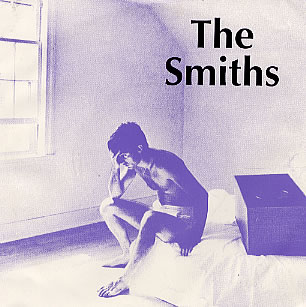
"A simple cross-pollination of their earlier singles brings us this short burst of nothing much. Clifford T. Ward with his new haircut still handles the vocals (with a different script to the rest of us) and the guitars wobble about. I shall probably play it for weeks, unless I die (because when you're dead you can't play many records really)."
Unknown reviewer
An educated guess would suggest this review originally appeared in Melody Maker.
Reprinted WITHOUT PERMISSION for non-profit use only.
"Not only is this a good record but it's good on the 7" (shock, horror). I haven't got a clue what it's all about, but suffice to say the voice sounds as dextrous as ever and thirty words go where twenty belong. This ambles along nicely but is this guy sane? What's the betting the next one is called 'Mum I'm Just Going Down The Shops'?"
Unknown reviewer
The source of this review is unknown.
Reprinted WITHOUT PERMISSION for non-profit use only.
"The Smiths are impossible to love unless you wish to mother Morrissey. There is a wistful optimism about the music they make that is very easy to like a whole lot but the main man-child's self-adoring ennui sticks in the craw once you realise that this is what he is going to be doing on his death bed. Ennui gets a little boring after a while."
Tony Parsons
New Musical Express, August 25, 1984
Reprinted WITHOUT PERMISSION for non-profit use only.
"A bit of a let-down after the sublime 'Heaven Knows', this finds The Smiths sounding altogether a bit too Smithsy, if you know what I mean.
Those early Orange Juice guitars and Morrissey's three-notes-to-every-syllable singing were fine hung on a great song like 'Heaven Knows I'm Miserable Now', but the whole thing becomes boringly repetitive when the song's not up to much.
Steven, it really is nothing much. I'll stick with its predecessor and wait for the next one."
Sunie
No. 1, September 1, 1984
Reprinted WITHOUT PERMISSION for non-profit use only.
To watch The Smiths perform 'William, It Was Really Nothing' on Top Of The Pops on YouTube, click here
Johnny Marr on...
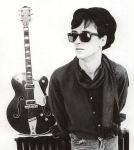
'William, It Was Really Nothing'
"'William' is quite a whimsical song really. I don't think it's broken all the rules in pop music, but to start a song with a short verse and then follow it with three choruses is quite good."
- Earsay interview, 1984
For more Johnny Marr, see The Man Who Caught The Common Cold
